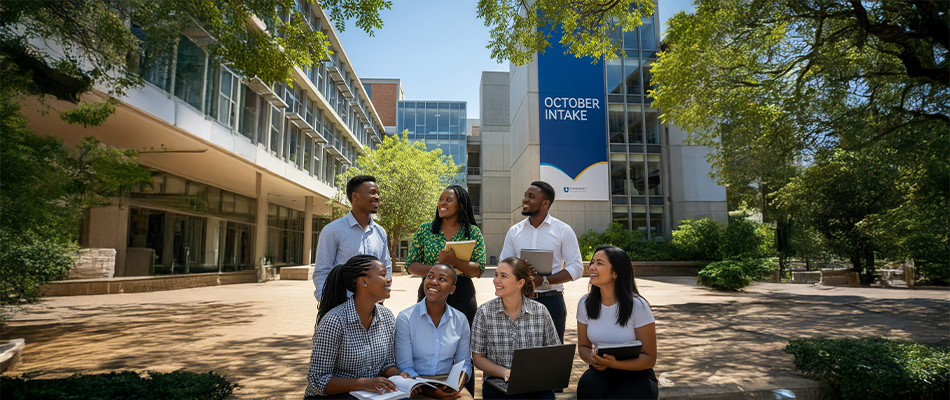Studying abroad is a life-changing experience, and South Africa has become a well-known destination for international students due to its quality education and diverse culture.
According to Business Day, South Africa boasts one of Africa’s best higher education systems. However, the cost of studying in another country can be high. Managing tuition fees, accommodation, and living expenses can be challenging for international students coming to South Africa. This is where international student loans play an essential role.
Study loans for international students are financial assistance that helps foreign students in South Africa cover the costs of completing a degree abroad. This article covers the types of student loans available to international students, eligibility, the application process, and required documents.
Table of Contents
Types of International Student Loans
International students who move to South Africa can apply for student loans from their home governments, private banks, and other lending institutions. Before finalising a lender, international students should consider interest rates, repayment plans, and flexibility. Let us review the various types of international student loans.
- Government-Backed Loans: These loans are typically reserved for South African citizens, but in rare cases, international students might qualify for certain loans through government programmes, especially if they have permanent residency or special student permits.
- Private Loans: Most international students rely on private financial institutions, such as banks, to fund their education. These private loans are designed specifically for students and may require a co-signer or guarantor, usually a local citizen or resident. Interest rates on private loans may vary by lender and applicant creditworthiness.
- University-Sponsored Loans: Some universities in South Africa offer financial aid through loans or deferred payment plans for international students. These options often come with lower interest rates or more flexible repayment terms and are designed to make education more accessible to students from different countries.
International students should carefully explore each option, compare interest rates, and consider loan terms before making a decision.

Government vs. Private International Student Loans
Government-backed student loans help promote higher education for certain segments of society. They can help previously disadvantaged youth access quality education and improve their standard of living. Private loans, on the other hand, are open for all international students as long as they fulfil the minimum eligibility requirements.
Short-Term vs. Long-Term Loan Options:
Term duration refers to the period an applicant has to repay the international student loan. Any amount that can be returned within 24 months or less is considered short-term, while student loans that take longer than 24 months are considered long-term.
It is important for international students to compare lenders before finalising the one that best suits them. Students should consider criteria such as flexibility, repayment terms, etc., before signing any documents.
Know More about the Best Student Loans in South Africa
How Do I Qualify for an International Student Loan?
To qualify for international student loans, the applicant must meet the eligibility requirements of their selected lender. Here are some of the most common requirements to qualify for a student loan:
- Acceptance at a recognised institution: Lenders require proof of admission from a reputable, accredited institution. Some lenders only approve international student loans for degree programmes.
- Citizenship and residency: Certain lenders provide student loans to international students based on their citizenship and residency status in the host country. Additionally, government loans may be available only for degree programmes in certain countries.
- Co-signer: Most lenders require the signature of a guarantor who meets the minimum income requirement. Some lenders require the guarantor to pay the fees and interest on the loan amount while the applicant is studying.
- Credit history: Lenders may also review the applicant’s and/or guarantor’s credit history to confirm there are no outstanding student loan defaults. A healthy credit history raises the chances of securing an international student loan.
- Visa status: Lenders may also require an approved study visa before they can begin processing the international student loan application.
- Academic performance: Some study loans for international students regularly monitor academic performance and require students to maintain a minimum GPA to remain eligible for the loan.

What is the International Loan Application Process?
If you are planning to apply for a student loan, make sure to complete your research on the various types of international student loans available to you. These could be government loans that could be applied for in your home country or the host country. Alternatively, you could apply for a student loan from private banks or lenders.
The application process might vary slightly depending on your lender, but most follow these general steps:
- Check Eligibility: Before applying, ensure that you meet the eligibility criteria set by the loan provider. This includes having a valid study permit, proof of admission to a recognised South African institution, and, in some cases, a co-signer or guarantor.
- Research Loan Providers: Look for banks, private lenders, or universities that offer loans to international students. Compare interest rates, repayment options, and any additional fees.
- Gather Required Documents: To apply, you will typically need to provide the following:
- Proof of enrollment or admission letter from the university.
- Valid passport and study permit.
- Financial statements or proof of income (either your own or that of a guarantor).
- Personal identification documents for both the applicant and the guarantor, if applicable.
- Submit Your Application: Once you have gathered all necessary documents, submit your application either online or in person, depending on the lender’s requirements. Ensure all details are accurate to avoid delays.
- Await Approval: After submitting the application, the lender will review your information and determine whether you qualify for the loan. The approval process may take anywhere from a few days to several weeks, depending on the lender.
- Sign the Loan Agreement: If approved, carefully review the loan terms and conditions before signing. Make sure you understand the interest rates, repayment schedule, and any penalties for late payments.
- Disbursement of Funds: Once the loan is approved and the agreement is signed, the funds will typically be disbursed directly to your university or deposited into your account, depending on the arrangement with the loan provider.
By following these steps, international students can successfully navigate the loan application process and secure the financial support needed for their education in South Africa.
Documents Required for an International Student Loan
When you apply for international student loans, most banks and lenders require documents to verify all the details you provide in the loan application. While the final set of documents required with your application might differ depending on the lender, these are the most commonly required documents for the international student loan application process:
- Valid Passport and/or national ID: International students must have a valid passport with an expiry date that extends beyond their intended duration of study. When applying for an international student loan in their home country, students will also be asked to provide their national ID as proof of citizenship.
- Letter of acceptance: Lenders require students to provide proof of acceptance from their university, including the programme name and duration. Some lenders might have a list of pre-approved institutions.
- Academic record: Students with solid academic backgrounds are more likely to qualify for international student loans. They might also be able to negotiate better repayment terms.
- Financial need: Applicants must demonstrate financial need and provide documentation of tuition, accommodation, books, and other expenses. They should also provide income, bank statements, and documentation of approved scholarships and grants.
- Guarantor’s documents: If the student loan requires a guarantor, the applicant needs to provide residency proof, bank statements, and income statements.

What are the Repayment Plans for International Student Loans?
Before securing an international student loan, candidates should understand the repayment terms and assess whether they are feasible given their future earnings. Apply only for the amount you need to make it easier to complete repayments within the agreed timeframe.
Depending on the lender, repayment of international student loans can begin immediately after graduation, or students can enjoy a six-month grace period. Repayment also varies depending on interest rates and loan duration.
Let us compare the different repayment plans available for international student loans.
| Repayment Plan | Overview | Pros | Cons |
| Standard Repayment | Fixed monthly payments over 10 years | Simple and predictable paymentsLower total interest cost | Higher monthly payments |
| Income-Driven Repayment (IDR) | Monthly payments based on income level | Lower monthly paymentsPossible loan forgiveness | Higher total interest over timeLonger repayment period |
| Graduated Repayment | Payments start low and increase every 2 years over 10 years | Easier payments at the beginning | Higher total cost than standard repayment |
| Extended Repayment | Repayment period extended up to 25 years | Lower monthly payments | Longer repayment termHigher overall interest paid |
Conclusion
International student loans help thousands of students fulfil their academic dreams at reputed institutes worldwide. These loans give students the freedom to pursue their educational goals without being constrained by financial constraints. International students should remember to research and understand the terms of the agreement before signing any loan documents.
Regenesys offers student loans to support your educational journey, making higher education more accessible and affordable. If you have any questions or need more details about student loans, please visit our Student Loans page.

FAQs
Can students apply for international student loans?
Yes, it is possible for students to apply for international student loans. These loans can be applied for in their home or host country. Students should research restrictions and criteria.
What are the documents required for an international student loan?
Most student loan documents require a passport, student visa, letter of acceptance, financial need, and guarantor documents.
What are some available student loans for international students?
Students can apply for loans from the government, private banks, and private lenders.
How long do I have to repay my student loan?
The repayment term depends on the plan you select and ranges from 10 to 25 years.
How do I choose an international student loan provider?
Students should research available lenders based on their country of residence, the programme they choose, and the country where they plan to study. They should select a lender based on affordable interest rates and repayment plans.







